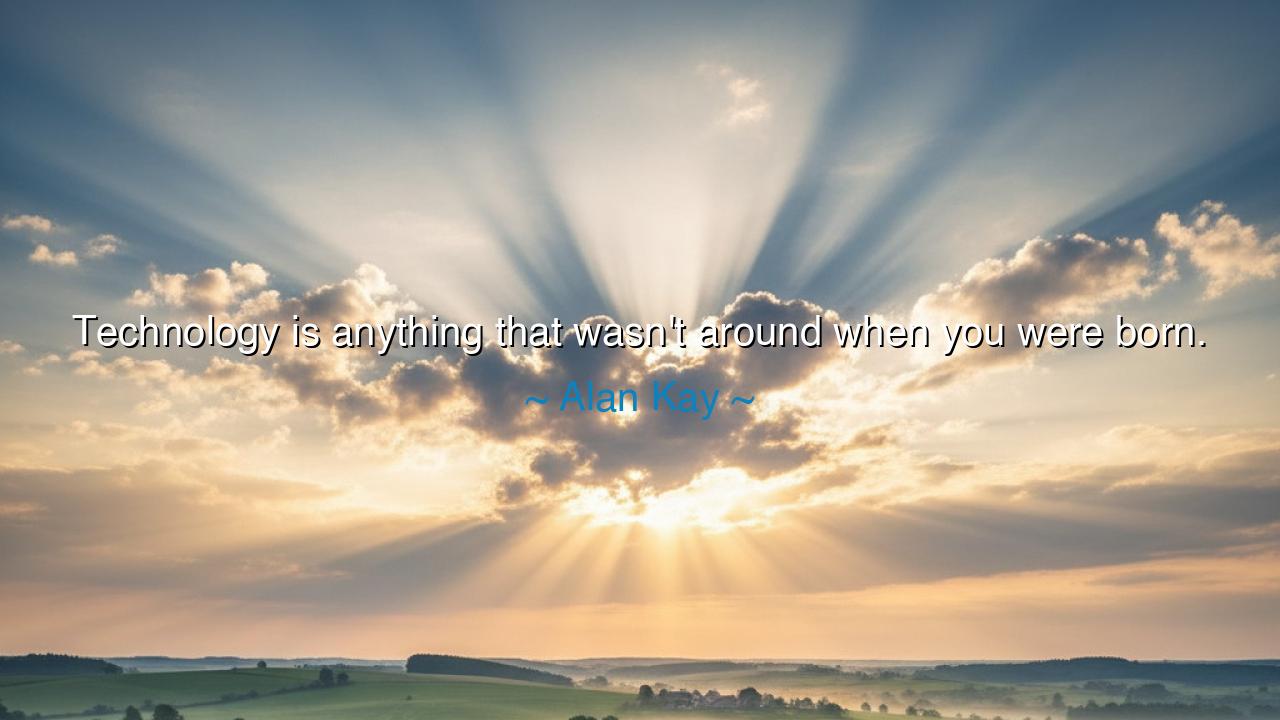
Technology is anything that wasn't around when you were born.






The computer scientist Alan Kay, a pioneer of modern computing, once spoke words that pierce through time and perception: “Technology is anything that wasn’t around when you were born.” In this saying, he revealed a truth both simple and profound — that technology is not some fixed and distant force, but rather a shifting horizon defined by the generations that behold it. What one age calls innovation, another age calls ordinary, and what once seemed magical soon becomes invisible, woven into the fabric of daily life.
For the ancients, the plow was technology, a marvel that turned barren soil into fields of plenty. For their descendants, the plow was no more wondrous than the air they breathed — their eyes instead marveled at the printing press, the steam engine, the electric light. Each generation inherits the innovations of the past as if they were simply part of the natural order, forgetting that they were once strange and contested. Thus Kay reminds us that technology is not defined by its essence, but by the moment of our first encounter with it.
History bears many stories of this truth. When the railroads first thundered across the earth, some feared their speed would tear apart the human body, for never before had man traveled so swiftly. Yet to those born later, the train was mundane, even slow. When the telephone first sang across wires, many considered it a curiosity of little use; now, to be without it seems unimaginable. And in our time, the internet and the smartphone — once hailed as wonders — are for the young as ordinary as fire or water. Every generation shifts the boundary of what is called technology.
Kay’s insight also carries with it a warning: that each age tends to undervalue the tools it inherits, and overreact to the ones newly born. The elders often look upon new inventions with suspicion, seeing only disruption; the youth embrace them as natural extensions of life itself. Thus the cycle repeats, and humanity struggles to balance reverence for tradition with openness to innovation. This tension has shaped the march of civilizations, and it will continue as long as man dreams beyond his present tools.
Consider the story of Socrates, who feared the written word. To him, writing was a dangerous new technology that would weaken memory and corrupt true learning. And yet, through writing, his teachings survived the ages, carried by parchment and ink far beyond his time. What he feared became the very vessel of his immortality. This is the paradox Alan Kay’s words reveal: today’s disruption is tomorrow’s normality, and what one calls technology, another calls life itself.
The lesson, therefore, is not to cling to the illusions of permanence, but to walk with humility and openness. When you behold a new invention, do not fear it simply because it was not part of your birth-world. Likewise, do not worship it as though it were salvation itself. Ask instead: how does this tool serve humanity? Does it bind us closer together, or pull us apart? Does it deepen wisdom, or merely increase speed? True discernment lies in neither rejecting nor blindly embracing, but in judging each technology by the fruits it bears.
So, O children of the future, remember this teaching of Alan Kay. Do not define technology merely by the novelty of your age, nor dismiss the familiar as unremarkable. See instead the continuum — the plow, the wheel, the compass, the press, the computer — all but chapters in the endless story of human ingenuity. And in this story, your role is not only to inherit but also to question, to shape, and to guide. For every invention will one day seem ordinary, but the wisdom with which you wield it will echo forever.






AAdministratorAdministrator
Welcome, honored guests. Please leave a comment, we will respond soon